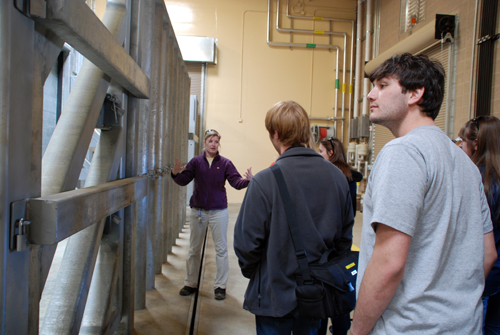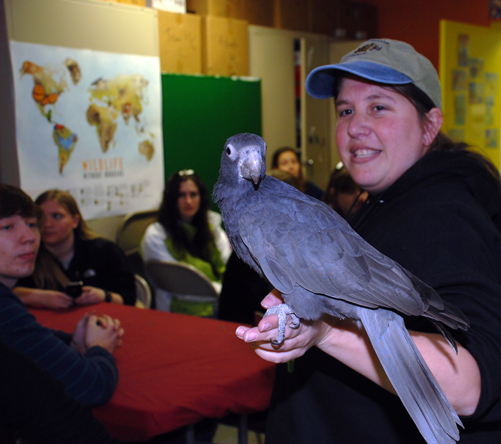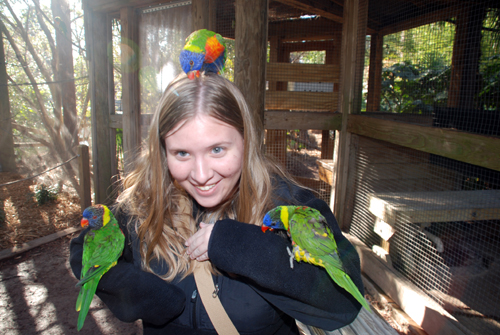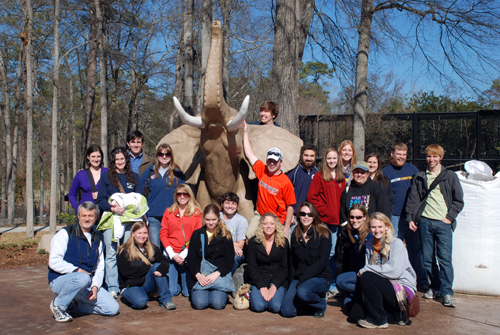COSAM News Articles 2011 March The Society for Conservation Biology gets a behind-the-scenes tour of the Birmingham Zoo
The Society for Conservation Biology gets a behind-the-scenes tour of the Birmingham Zoo
The Birmingham Zoo's Indo-Chinese tiger, Kumar, weighs 230 lbs. As a means of monitoring the tiger's overall health, Kumar gets weighed twice a month by trained zoo keepers utilizing a strategic series of hallways and barriers, or holding area, connected to his exhibit. Indeed, all of the Birmingham Zoo's big cats are monitored in this fashion, and the Society for Conservation Biology, or SCB, got a behind-the-scenes look at how the system works.
"It actually takes two people, a primary and a secondary, who are trained, to work these cats at all times," says Zoo Keeper Meghan Nemes. "Only two people can enter the holding area at any time and there always has to be two doors between them and the big cats at all times. The reason is, if a lion breaks through one door, there will be a second door for protection."
Field trip participants also got an up-close look at how the zoo's animal specialists train large animals, like lions, so that any health-related procedure will be made easier. For example, by commanding a lion to stand on its hind legs and place its front paws on a fence, keepers are able to inspect the animal's claws and underbelly.
"This training makes our lives easier, their lives easier, and it keeps the vet away," says Zoo Keeper Tray Morgan.
SCB members also learned how keepers communicate to one another through a series of checks and balances.
"In the keeper area, we have a log book where we communicate with one on another on everything from changing a light bulb to documenting the animals we inspected," says Nemes.
Following the behind-the-scenes tour of some of the world's deadliest predators, participants gathered in the children's area of the zoo where keepers demonstrated the kinds of special animal presentations they provide to younger groups of zoo visitors. The greater vasa parrot, a curious grey bird that is native to Madagascar, was first on the list, followed by the hyacinth macaw.
Native to South America, the hyacinth macaw is one of the largest parrots in the world. Due to loss of habitat and over collection for the exotic pet trade, the hyacinth macaw is currently listed as an endangered species.
"She has a very strong beak. We always teach the visitors about their beak because a lot of people want to get them as pets. And they don't make the best pets, especially for the average visitor, because they do take a lot of time, they yell, they scream, and their beak is able to break your finger," Zoo Keeper Andy Schertz told the SCB audience. "So we try to incorporate that into our programs by having a Brazil nut, which is one of the strongest nuts in the world, and have someone try and break it open. Then we give it to her (the hyacinth parrot) and of course, she can break it open in, like, three seconds."
Schertz also taught the Auburn students about the three-banded armadillo and the Burmese python.
"Burmese pythons are historically from southeast Asia. Of course, people get these as pets a lot and they get too big for their home tanks and they release them. The ones that release them in Florida, they can survive. So they've actually become a big problem, a big invasive species," says Schertz.
In addition to the back-stage tour of predators and the live-animal demonstration, SCB students got a sneak peek at the new Trails of Africa Exhibit that's scheduled to open this spring. Africa Keepers Kelley Rogers, Laura Schillinger and Caroline Jones discussed the Birmingham Zoo's elephant, 29-year-old Bulwagi, and the cutting-edge resources the new exhibit provides for his care. The exhibit will also serve other animals native to Africa, such as the rhinoceros and giraffe, and will educate the public on conservation efforts for African wildlife.
Before heading back to Auburn, SCB students had time to explore the Birmingham Zoo on their own, where they saw reptiles, primates, and animals found in Alabama.
"We had a good day," says Andrew Hopkins, President of SCB, "The elephant exhibit really impressed me. They have top-of-the-line facilities where they can train, and they are getting a bachelor herd of elephants, which is something that's unique among the zoos."
Latest Headlines
-
02/12/2025
-
02/11/2025
-
02/10/2025
-
01/30/2025
-
12/03/2024




